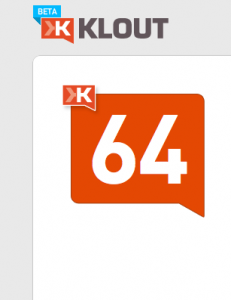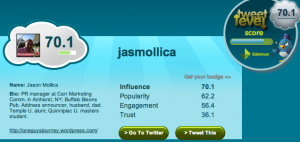This is a guest post from Jason Mollica.
If you want to get a reaction from a public relations or social media pro, ask them about influence. You are sure to get answers from each end of the spectrum. Some will say influence is misconstrued as “popular.” Others believe that follower numbers measure influence.
But is influence really measurable? Klout and Edelman believe it can be. To this day, I’m still not so certain.
Since Klout first launched in measurement tool in 2009, they have analyzed influence based on a user’s ability to “drive action.” According to Klout.com, “Every time you create content or engage you influence others. The Klout Score uses data from Twitter, Facebook, LinkedIn, and Foursquare in order to

measure.”
Just in the last year, Klout has begun to reward influencers with things likeSubway gift cards and exclusive content. In late July, Klout offered up music service Spotify to U.S. influencers (full disclosure, I received an invite and accepted).
Klout has come under fire though as making influence a popularity contest. And with influencers now getting rewarded for their scores, it in many ways back that angle up.
TweetLevel, also launched in 2009, is a Twitter measurement tool created by Edelman. By putting your Twitter handle into the page, it determines how influential and popular I am. For example, take a look at this graphic from my analysis at TweetLevel:

According to the 70.1 score, I am a “Twitter Superstar.” However, my trust score is 36.1, which means I’m not retweeted enough. So, how can I be a “superstar,” but have low trust? Conversely, Klout doesn’t mention trust in their parameters. That’s why I continue to believe that you can’t accurately measure a person’s influence in social media.
I do give Edelman credit though. They are continually tweaking their influencer tool. From the TweetLevel website:
“Even though we believe that it goes a great way to understand and quantify the varying importance of different people’s usage of Twitter, by no means whatsoever do we believe we have fully solved the ‘influence’ problem. What we would appreciate is your views, advice and criticism is crucial in helping us understand social media measurement.”
What’s the take away on social media influence? I don’t discourage you from using Klout and/or Edelman’s tools to check your numbers out. But, I wouldn’t take these scores very seriously. Influence should be based on a track record. Look at people like Deirdre Breakenridge and Brian Solis. They are always spreading knowledge and have published books that are considered “must haves” on social media usage.
I don’t need a score to tell me what they bring to the table.
Jason Mollica is a public relations manager at a strategic marketing and PR firm near Buffalo, N.Y. He’s also a social media strategist and consultant. You can find him on Twitter, @JasMollica, and at his blog, One Guy’s Journey.


It’s very true that influence is a hot topic these days, but very hard to put real meaning behind what it actually means and how it can be determined. While I agree that both Klout and Edelman are doing interesting jobs of helping to point out some people, you can’t always take what a computer algorithm says to heart.
My take on this topic is that tools like Klout, Edelman’s Tweet Level and even a tool like Sysomos (whom I work for) can help in pointing you in the right direction of someone that may be of interest for your certain needs, but from there you need to have a real person sit down and evaluate. Influence is really a feeling that comes from the gut and no computer code can ever reproduce that. Once you’ve identified someone of potential interest, it’s then up to a real person to sit down and evaluate if that person really does fit for whatever it is you’d like to do with them. That’s going to be a decision that comes from the gut, not a bunch of 1’s and 0’s.
Cheers,
Sheldon, community manager for Sysomos
Hi Jason ..Thank you for including me in your post. You know how I feel about the numbers. They don’t give you the full inside picture of the characteristics that motivate people to support and share information on the influencer’s behalf. Nice post!
@dbreakenridge Not a problem, Deirdre. Your influence can’t be measured… well, maybe the amount of students/pro that participate in #PRStudChat is a way! Thanks for all you do for pros and students!
@40deuce Sheldon, I like your answer here. Klout, Edelman, etc can be used as part of the whole equation in determining who you believe is “influential.”
And, you are right, it should come from you gut, not an algorithm.
Best,
Jason
Thank you!! I love to help the pros and students. It’s my way of giving back 🙂 @JasMollica
My problems isn’t with the tools or that it’s making influence a popularity contest. I actually believe that the measurements are of popularity rather than influence, which wouldn’t even be a problem IF it wasn’t being billed as influence. Measuring popularity has its place. But there’s a huge, wide, dark line between the two and mixing them up is murky.
@Tinu
Hi Tinu,
Thanks for your comment. I actually agree with your thoughts here. I think influence is being blended with popularity. For example, if you get K+ in social media, it most times is based on popularity. I’ve seen folks get these K+ marks and it really doesn’t make sense why.
I think these need more research before influence can truly be measured… if at all.
Jason
@Tinu
Hi Tinu,
Thanks for your comment. I actually agree with your thoughts here. I think influence is being blended with popularity. For example, if you get K+ in social media, it most times is based on popularity. I’ve seen folks get these K+ marks and it really doesn’t make sense why.
I think these need more research before influence can truly be measured… if at all.
Jason
[…] Measuring Social Influence (jeffesposito.com) […]
[…] Measuring Social Influence […]
[…] A Klout score does NOT accurately portray influence or who is influential. In a guest post I did for Jeff Esposito’s blog in August on Klout (and the new Klout Perks), I […]